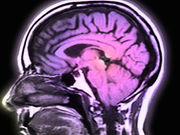Deep brain stimulation appears to boost function and quality of life
FRIDAY, Sept. 23, 2016 (HealthDay News) — Deep brain stimulation (DBS) may help patients with traumatic brain injury gain more independence, according to a study published recently in Neurosurgery.
Ali Rezai, M.D., director of the Neurological Institute at The Ohio State University in Columbus, and colleagues investigated the effects of DBS in four patients. All had suffered severe brain damage in automobile crashes six to 21 years earlier. The patients didn’t have difficulties with being awake or alert, but they were significantly impaired when it came to performing activities of daily living. All required daily supervision and couldn’t be alone overnight. Three needed assistance with dressing, grooming, and using the toilet. The DBS lead was connected to stimulate the damaged areas of the brain with electrical impulses.
After two years of treatment, the researchers reported that three of the four participants demonstrated behavioral and emotional improvements, and substantial gains in functional independence. The investigators saw improvements in alertness and engagement among all four participants. Two needed less assistance with the activities of daily living, and three of the four increased their involvement in activities outside of the home.
“This first study of DBS to this target for severe traumatic brain injury supports its safety and suggests potential effectiveness to improve function years after injury. The primary impact was on behavioral and emotional adjustment, which in turn improved functional independence,” the authors write. “However, the results support the need for further investigations using randomized, sham-controlled comparisons.”
Full Text (subscription or payment may be required)
Copyright © 2016 HealthDay. All rights reserved.








